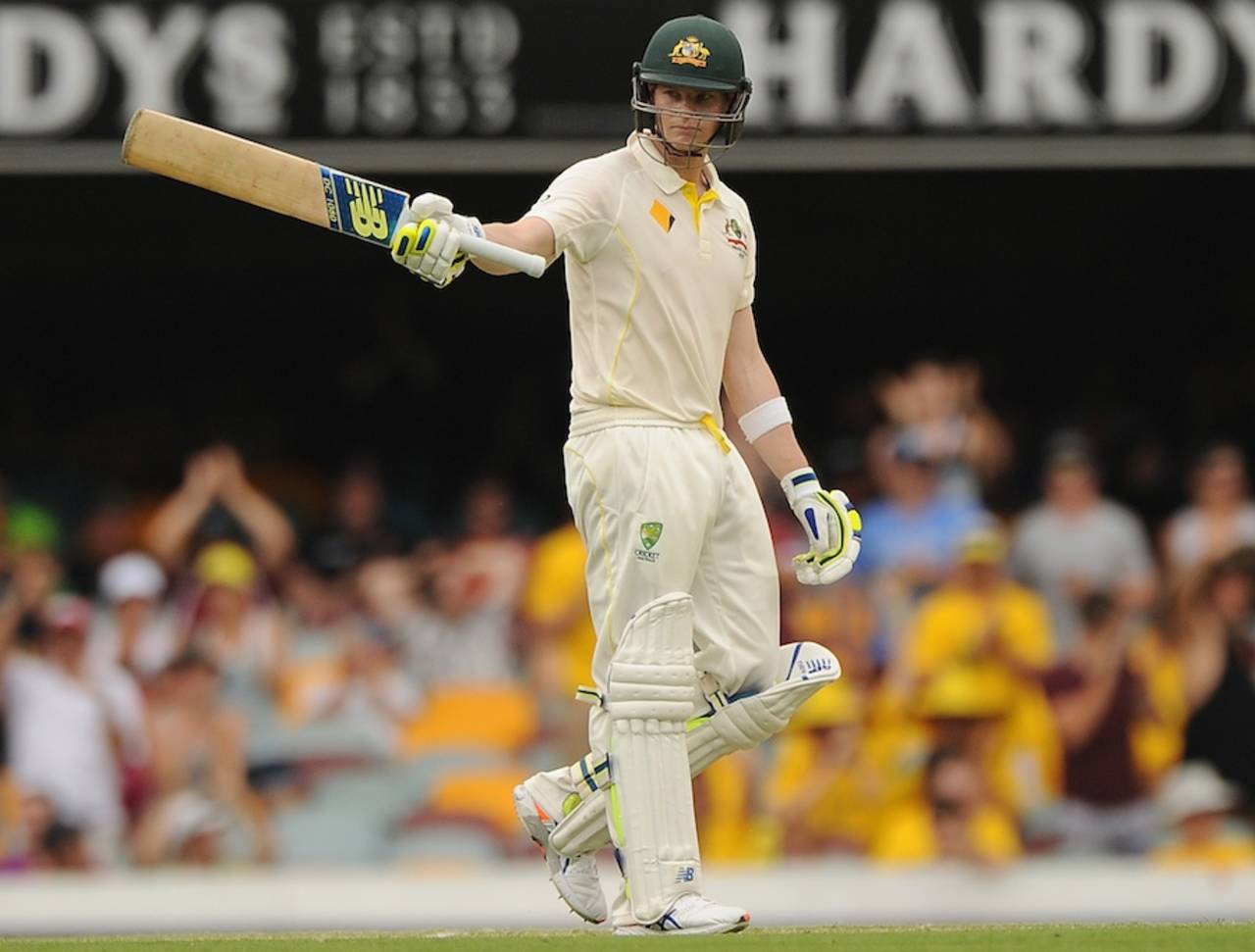"Steven Smith fidget" - 375,000 Google search results. "Steven Smith skittish" - 160,000 Google search results. Not the most important statistics to consider when assessing candidacy for the Australian Test captaincy, but interesting nonetheless.
By definition, neither of those words screams confidence and stability. Perhaps you think Derek Randall, but probably not Mike Brearley. Yet we were reminded often in the past week that
Australia's 45th Test captain - the man taking on the leadership job often referred to as the second most important his country has - was so confident of his path in life that he ignored a not-inconsiderable societal taboo and left school early, essentially narrowing his options to one.
When Steven Smith's mates lolled about on gap years and slept through university lectures, Smith was entering the less-forgiving world of professional cricket. He did at least play like a boy. He still does, in some respects: the joyful spirit of his batting, the terrier fielding, the mixed bag of novelty spin almost exclusively comprising wicket balls and boundary balls.
His story is not unprecedented, but how wonderfully instructive of the cricketer's capacity for growth and reinvention that Smith, originally held up as a spin wunderkind in the post-Warne era, should morph into something closer to Australia's other golden-era pillar, Ricky Ponting.
Perhaps that's blasphemy and slight exaggeration, but to even consider the merit of the theory shows how far Smith has come from the hyperactive scamp who nicked everything in the corridor outside off stump. Now he's probably the closest thing to a batting certainty that Australia have; the strangest-looking middle-order rock in cricket.
Many wise judges felt that Australia would find it far harder to replace Michael Hussey than they would the late-career version of Ponting. Once
Michael Clarke finally goes for good as well, Smith might in some senses be performing all three of their roles. It's an ageing Australian line-up now and one imminently due personnel changes. Clarke's ride was often rocky and so too Smith might want to look into a precautionary suspension check.
Going in his favour is the way he's batting. It's easy to write off and even lament the influence of short-form cricket on Test techniques, but arguably the best three Test batsmen right at this second - AB de Villiers, David Warner and Smith - do not owe much in their techniques to conventional cricket. It would be hard to argue that Smith possesses the momentum-changing explosiveness of the other two, but in his lofted straight drive - the current benchmark of the art - and in his now-distinctive cross-bat swat past the bowler he possesses two murderous, authoritative strokes. Strokes that make you flinch. Just ask Ian Gould.
They're also shots you can't set a field to and partly explain why Smith is now a man who can't be kept quiet in any scenario; not on the subcontinent, not under the pressure of Ashes cricket, not in the game's shorter forms and not even against the might of South Africa's pacemen. Alone they're significant weapons, but now they're also welded to a solid base of more muted, strike-turning options. Smith's destruction is gradual; a trusty sledgehammer rather than a wrecking ball or dynamite. Three sessions on and you wonder how the hell he has demolished the entire house.
Smith also looks like making runs every time he bats now, a handy trait for a captain and also something that could, at least on a short-term basis, free him of self-doubt in his leadership role. With the bat he rarely gets bogged down and there's an ironic by-product of that ceaseless, labyrinthine combination of tics and tugs; if Smith is ever frazzled as he bats it's virtually impossible from his body language to tell.
Smith's destruction is gradual; a trusty sledgehammer rather than a wrecking ball or dynamite. Three sessions on and you wonder how the hell he has demolished the entire house
So Smith the batsman seems pretty well on track, but what about the leader? Tactically, he has proven himself astute in the prior experience he has had. An interesting element of his rise, though, is that what some see as a strength - that he has quickly been named captain at virtually every level he has played - can also be seen as a weakness. At his grade cricket club Sutherland he got the nod at 19. He was 22 when he first performed the duty for Sydney Sixers, and 24 for New South Wales.
Doubtless he'll have learned a thing or two from Clarke and Brad Haddin, but in being thrust into all of those jobs so early he hasn't benefited from anything close to the rich and sustained period of mentorship his predecessors had.
Perhaps this won't be a problem and Smith knows his own mind well enough now, but there'll probably be rough patches too. His form won't always hold, for one. If he needs advice in that area he need look no further than his potential Ashes rival Alastair Cook, who at birth was probably named captain of all the babies in the maternity ward. The possibility remains that only one or neither of them will be in charge next winter.
You'd sense, though, that Smith's not going anywhere. Even if the admirable Clarke makes it back, it will be for one final tilt at the urn. In that case Smith will be standing at the other end, ruffling his trousers, yanking his pads, lifting his helmet lid and scratching endlessly at the pitch - all the while encrypting the stillness and focus that lay below the surface.
Russell Jackson is a cricket lover who blogs about sport in the present and nostalgic tense for the Guardian Australia and Wasted Afternoons. @rustyjacko
